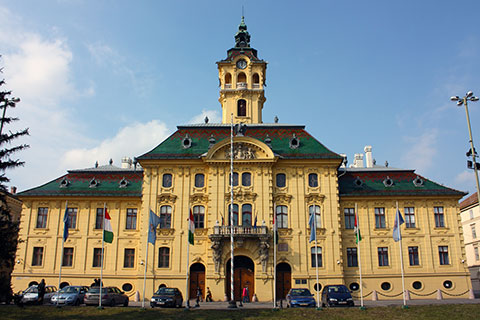
Study in Hungary
Last edited on 04 Mar 2026
Hi! Üdv Magyarországon!
Hi! Welcome to Hungary!
Hungary is situated in Central Europe and has been a melting pot of European cultures. Budapest, its capital, is seen as the one of the most beautiful European city. The population of the country is 10 million and has a pleasant continental climate. Hungarian is the country’s official language, English and German are taught in schools as second languages. With a combination of Western and European influences, Hungary boasts a rich heritage and culture that attracts people from all over the world. Next to that, Hungary offers more attraction, it has geological sites, ancient Roman ruins, relics from Turkish culture, and well-preserved buildings, providing an insight into the different styles in the history of European architecture. Eight of these sites are UNESCO World Heritage.
As the bridge of Central and Eastern Europe, Hungary offers a combination of many attractions from both regions – yet it also have its pride of its own identity. This pride is not without foundation. Despite the country is relatively small, it has much to offer visitors, from the architectural and cultural delights of capital city Budapest, to vineyard-covered hills and historic castles. With so many natural and manmade attractions, combined with relatively low living costs and a strong focus on internationalization, it seems likely that Hungary’s popularity as a study destination will continue to grow. Choose to study in Hungary now, and you could be at the leading edge of that trend.
Well regarded internationally, the Hungarian higher education sector consists of state universities, public universities, state financed colleges and religious educational institutions – with higher education qualifications recognized in the EU and beyond.
While not as firmly established on the study-abroad map as European destinations like the UK, Germany or France, Hungary is committed to becoming a higher education hub. Universities in Hungary are welcoming growing numbers of international students, both on exchange programs and for full degrees, and are increasingly offering courses taught in languages other than Hungarian, most commonly English.
Higher Education System
In line with the Bologna Process, which aims to make higher education systems across Europe more compatible, universities in Hungary offer three levels of degree: alapképzés (bachelor’s), mesterképzés (master’s) and doktori képzés (doctorate). Bachelor’s programs typically last three or four years, master’s programs one or two, and doctorate programs three years. In some subjects, it is also possible to complete a single five- or six-year course, which combines the bachelor’s and master’s levels. The country has a total of 20 state-financed universities, seven public universities, ten state-financed, and 31 non-state financed colleges.
Language requirements for studies at universities in Hungary
Hungarian
According to Hungarian legislation, foreign students must pass an exam in Hungarian language as a requirement to be awarded the diploma. In the event you are taking undergraduate studies, you will be required to have a level of command of Hungarian corresponding to, at least, C1 in the Europass Language Passport. For graduate courses, your institution will determine which language exams you will have to take before you can be awarded the diploma. However, if the language of instruction is not Hungarian, you are exempted from the Hungarian language examination requirement.
English
If the language of instruction is English, you will be requested to prove your level of command of the English language. For this purpose, you may present the results obtained at internationally recognized examinations, such as the TOEFL test, or pass an exam at the Hungarian institution where you will be studying. If you are an EU student, you may also ask your institution to evaluate your English studies from upper secondary school to learn whether they are sufficient for you to meet the language requirement. Students from English speaking countries who have received their upper secondary education in English are usually exempted from passing any English language examination.
Preparatory courses
If you have not taken or passed the university entrance examination in your home country or you are not an EU student, you will most probably need to enroll in a preparatory course at the institution you are interested in before applying for higher education studies. The preparatory courses aim at providing students with the required level of knowledge in basic subjects to access the selected study program. These preparatory courses last at most 2 semesters and students are charged tuition fees that vary depending on the program and institution.
Minimum grade point requirement to access the university studies in Hungary
Students in Hungary are ranked based on their previous studies when applying for a study place at higher education institution. This ranking is based on the student's grade point average from previous studies and even work experience if applying for specific programs that require it. Therefore, always check with your university/colleges in Hungary about the minimum passing grade you need to meet.
You may use the European grades comparison chart to learn what the equivalence of your grade in Europe would be.
Source: Act CXXXIX of 2005 on Higher Education in Hungary
Universities in Hungary
Student Cities in Hungary
Budapest

Split in two halves (Buda and Pest) either side of the Danube River, and known for its attractive architecture, Budapest is undoubtedly one of Europe’s most aesthetically appealing cities. The city’s architectural and historic importance has earned it a place on the UNESCO World Heritage list, where it is described as “one of the world’s outstanding urban landscapes”.
Budapest doesn’t just look beautiful; it also offers plenty to do and explore, from world-renowned spas, art galleries and classical music, to trendy cocktail bars, bohemian cafés and outdoor clubbing venues. The best-known of Budapest's cultural events is the huge Sziget music festival, held on Óbudai Island in the centre of the Danube every August – but there’s plenty going on all year round.
Three universities in Budapest feature in the QS World University Rankings® 2016/17 – Eötvös Loránd University (ranked 601-650), Corvinus University of Budapest (701+) and new entry Budapest University of Technology and Economics (also 701+). All three participate in Erasmus and various other student exchange programs. Other universities in Budapest include Budapest Business School,Hungarian University of Fine Arts, Semmelweis University (medical), Óbuda University (technical) and Central European University, a postgraduate-only institution which ranks in the global top 50 for politics.
Debrecen

Debrecen is Hungary’s second-largest city, although far smaller than Budapest, with 205,000 residents compared to the 1.7 million residents of the capital. Debrecen has briefly been the capital city of Hungary during two periods of history; the Hungarian revolution in 1848 and the end of World War Two in 1945. The city is the administrative, economic, educational, scientific and cultural center of the eastern region of the country, and the usual range of activities are available, including theater, live music, nightclubs and (in true Hungarian style) natural hot springs and spas. The city is also well known for its lively festivals, including the Flower Carnival in August, which involves millions of flowers being used to decorate a procession of floats.
Szeged

Hungary’s third-largest city, Szeged is located in the south of the country on the banks of the river Tisza. It’s nicknamed the ‘city of sunshine’, due to its warm climate and high number of sunny days. Szeged is also known as a cultural hub, and especially for its Open Air Festival, showcasing outdoor theater performances throughout the summer. Szeged is a university town with a good nightlife, and it’s an ideal choice for foodies, offering great local and traditional food, including salami and fisherman's soup (halászlé). The education center of south Hungary, Szeged is home to the highest ranked university in the country – the University of Szeged.
Application, Fees and Visas in Hungary
Student visas for Hungary
Students from within the EU/EEA do not need a visa to study in Hungary, but do need to apply for a residence permit within 15 days of arriving. Students from outside of the EEA should apply for a student visa residence permit before arrival, via their nearest Hungarian embassy. Applications should be submitted at least six weeks before departure, as the processing is likely to take at least a month.
Student visas for Hungary require the following:
- Passport (valid for at least three months after intended departure)
- One passport-sized photo
- Completed application form (can be downloaded from the website of the Immigration and Asylum Office)
- Proof of health insurance for the full duration of intended stay
- Proof that tuition fees have been paid (or exemption certificate)
- Proof of sufficient funds to cover living costs (bank account statement; or the declaration of the parents that they assume coverage of all costs of the stay in Hungary; or the document certifying the scholarship)
- Official letter of acceptance from a Hungarian university
- Proof of accommodation arrangements (the document certifying accommodation in a student hostel or the tenancy contract with a duplicate of the title deed)
- All international students are required to register their place of residence with the local authorities, as soon as possible after arrival.
Costs and funding to study in Hungary
Living costs are relatively low in Hungary, with students likely to need about US$600-850 per month to cover everything from accommodation to nights out. Living costs will be more expensive in Budapest, where rent will start from about US$340 per month.
While tuition fees are not insignificant, they are much lower than charges in countries such as the US or UK. They vary between universities and courses, with some courses as low as US$5,500 per year at the University of Debrecen, going up to US$16,900 per year to study medicine.
Some scholarships for international students are available from the Hungarian government, covering tuition fees, medical insurance, accommodation and a monthly stipend for residents of partner countries to study in Hungary at all levels. Students from within the EU may also be able to apply for a state-funded place, under the same system as local students. These are awarded based on academic grades, but are highly competitive, with the number of places available having been cut over the past few years. Students from Eastern Europe can also apply for scholarships from the Visegrad Fund.
Fast facts
- Capital: Budapest (also largest city)
- Borders with: Slovakia, Ukraine, Romania, Serbia, Croatia, Slovenia and Austria
- Official language: Hungarian
- Currency: Forint
- Member of the European Union since 2004
- Hungarian-language name for the country is Magyarország, and the people call themselves Magyars.
- Known for producing (and using) lots of the spice paprika
- Traditional Hungarian cuisine includes goulash (a soupy stew), palacsinta (pancakes), spicy sausages, dumplings and stuffed vegetables.
- The Danube River runs through the center of Budapest, and from north to south of the entire country.
- Major industries include mining, construction materials, textiles, chemicals and food processing.
- Hungary is one of the oldest countries in Europe, founded in A.D 896, before France, Germany or England.
- Hungarians broke the Guinness World Record for simultaneous kissing in June 2007, when more than 6,400 couples locked lips outside the parliament building in Budapest.
- Total population of just under 10 million, of which 3.3 million live in the metropolitan area of Budapest.
- When Hungarian people introduce themselves, their last name comes first.
Safe and friendly living environment might be the important aspects while deciding which country you would like to spend your time for study. If you agree, Hungary is the right place for you. Furthermore, favorable cost-to-value ratio and affordable living costs is definitely a “go”. Don’t you forget to have fun while pursuing you Bachelor, Master or even PhD degree. Hungary is one of the 15 most popular tourist destinations in the world with a capital regarded as one of the most beautiful cities.
No doubt for the education quality as you may know famous Hungarian innovations such as computer, diesel engine, helicopter, safety match and many more. Scholarships? Yes! Find more information on study in Hungary
Hungarian State Scholarships
Focus Scholarship: Bachelor, Master, PhD, non- degree
Competition: Designated Country base on scholarship types
Scholarship Coverage: Full Scholarships
Hungarian State Scholarships is offered base on bilateral cooperation agreements, currently with other 56 countries. The benefits awarded include tuition-free enrollment and monthly allowance. Indonesian applicants are eligible to apply for postgraduate and postdoctoral research as well as summer courses. This scholarship aim to support foreign students, researchers or lecturers in higher education institutions or in scientific or art institutions. Scholarship can be applied for in two ways: nominated by home country or submitting an individual application
Criteria
- At least 18 years old at the time of submitting the application. There is no age limit.
- Available for candidate who would like to enroll in the following level of studies: Bachelor or master or doctoral semester/partial studies (3-10 months) Full degree program of Bachelor or Master or Doctoral studies (36/24/36 months respectively) Short or long-term research (3 days - 10 months) Summer courses (2-4 weeks)
Stipendium Hungaricum Scholarship
Focus Scholarship: Bachelor, Master, One-tier master (both the bachelor and the master level of studies), Doctoral and non-degree programs (preparatory and specialisation courses)
Competition: Developing Countries
Scholarship Coverage: Full Scholarship
Stipendium Hungaricum Scholarship offered by Hungarian Ministry of Human Capacities and appointed Tempus Public Foundation to implement the initiative. This scholarship is designed only for incoming international students, including Indonesian prospective students who would like to pursue master and doctoral programs. In numbers, 27 host institutions are participating on this education support which offer 415 study programs in various languages.
Criteria
- Enrolled in the study program and university that is listed as scholarship’s partner
- Students shall have a level of English proficiency required by the Host Institution.
- Not available for Hungarian citizens (including those with dual citizenships)
- Not available for former Stipendium Hungaricum Scholarship Holders, who are re-applying for studies in the same cycle of education







